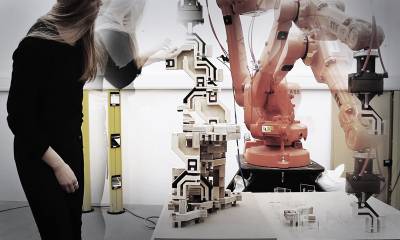This programme explores the frontiers of architecture and design, with an emphasis on the latest technological advances, particularly computation and robotics.
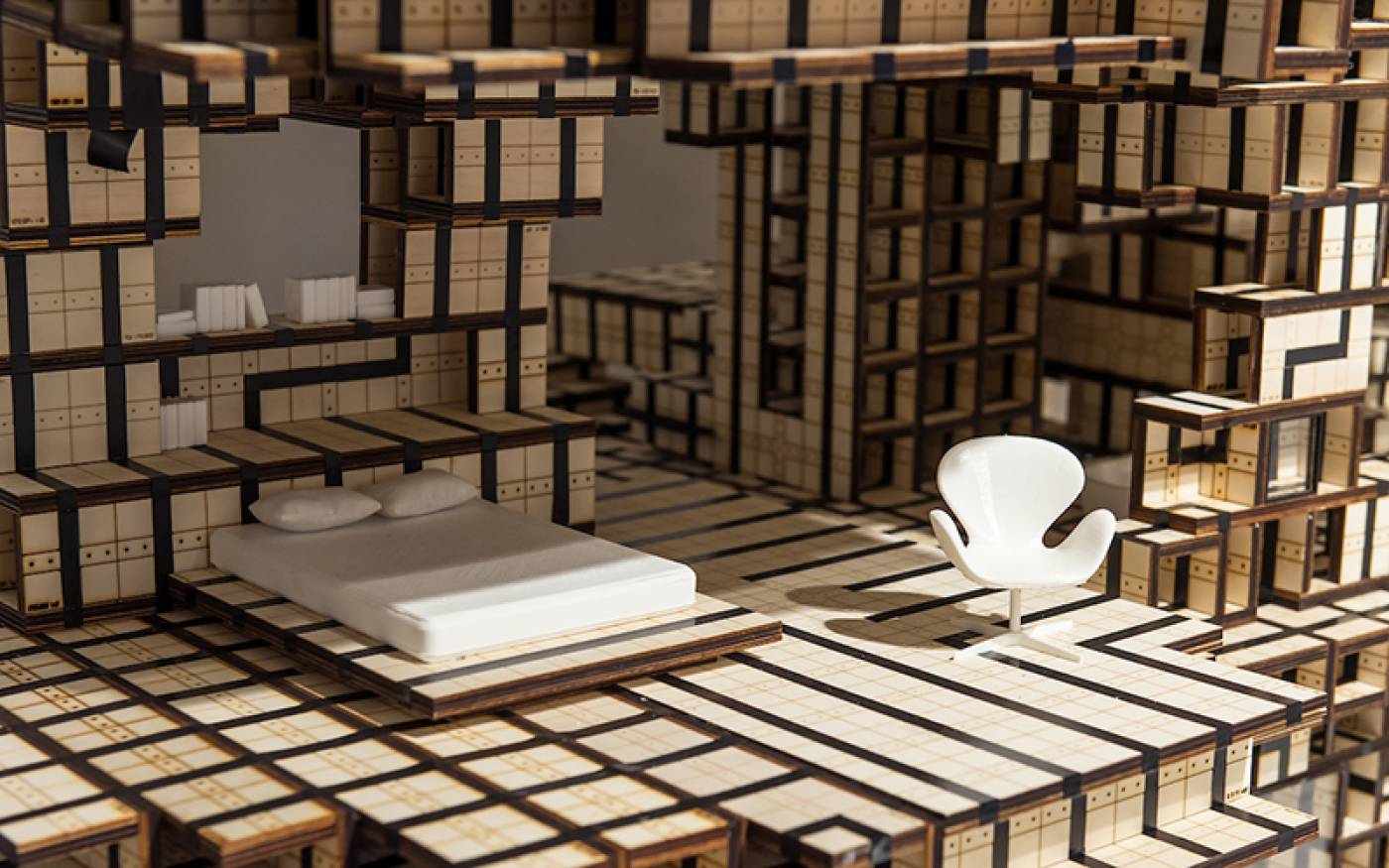
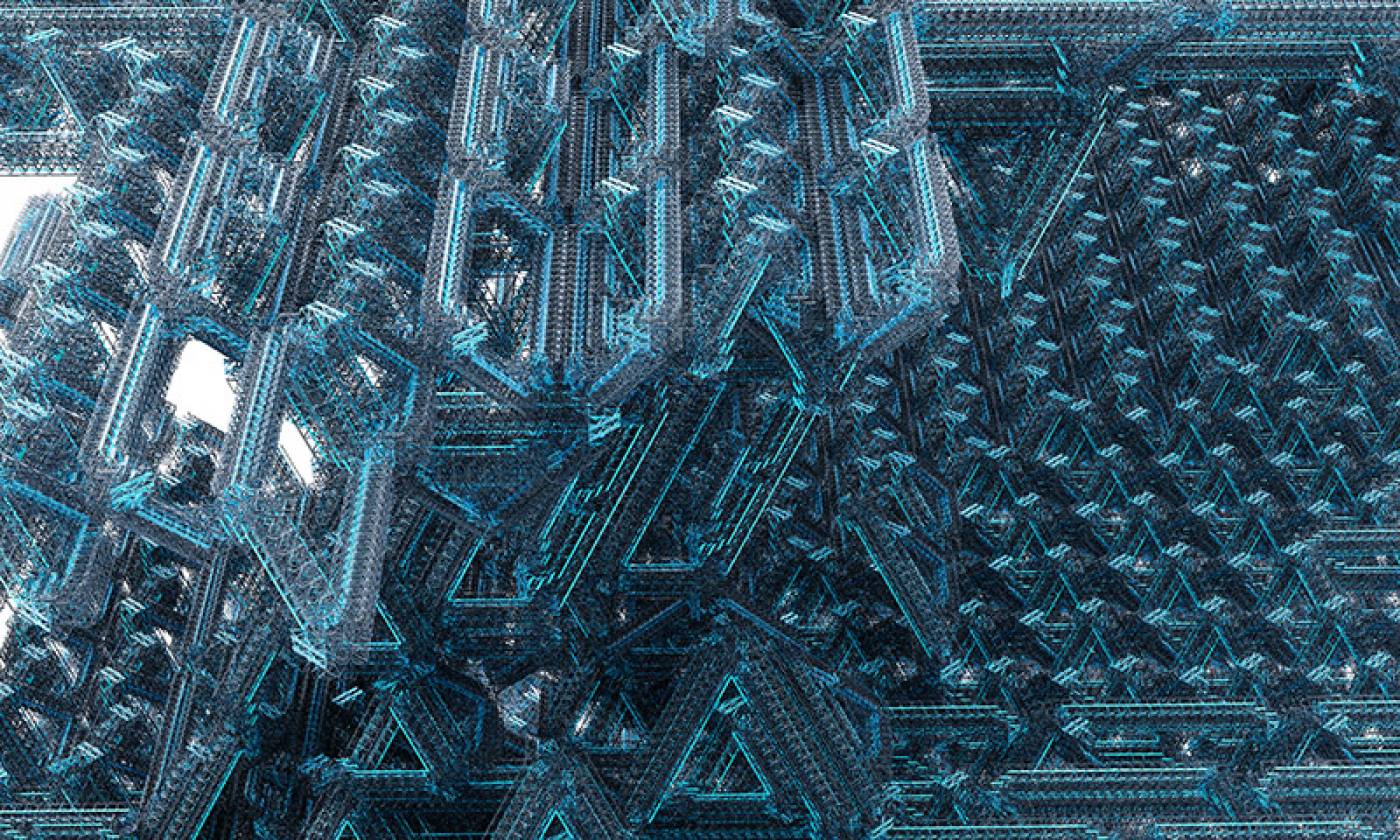
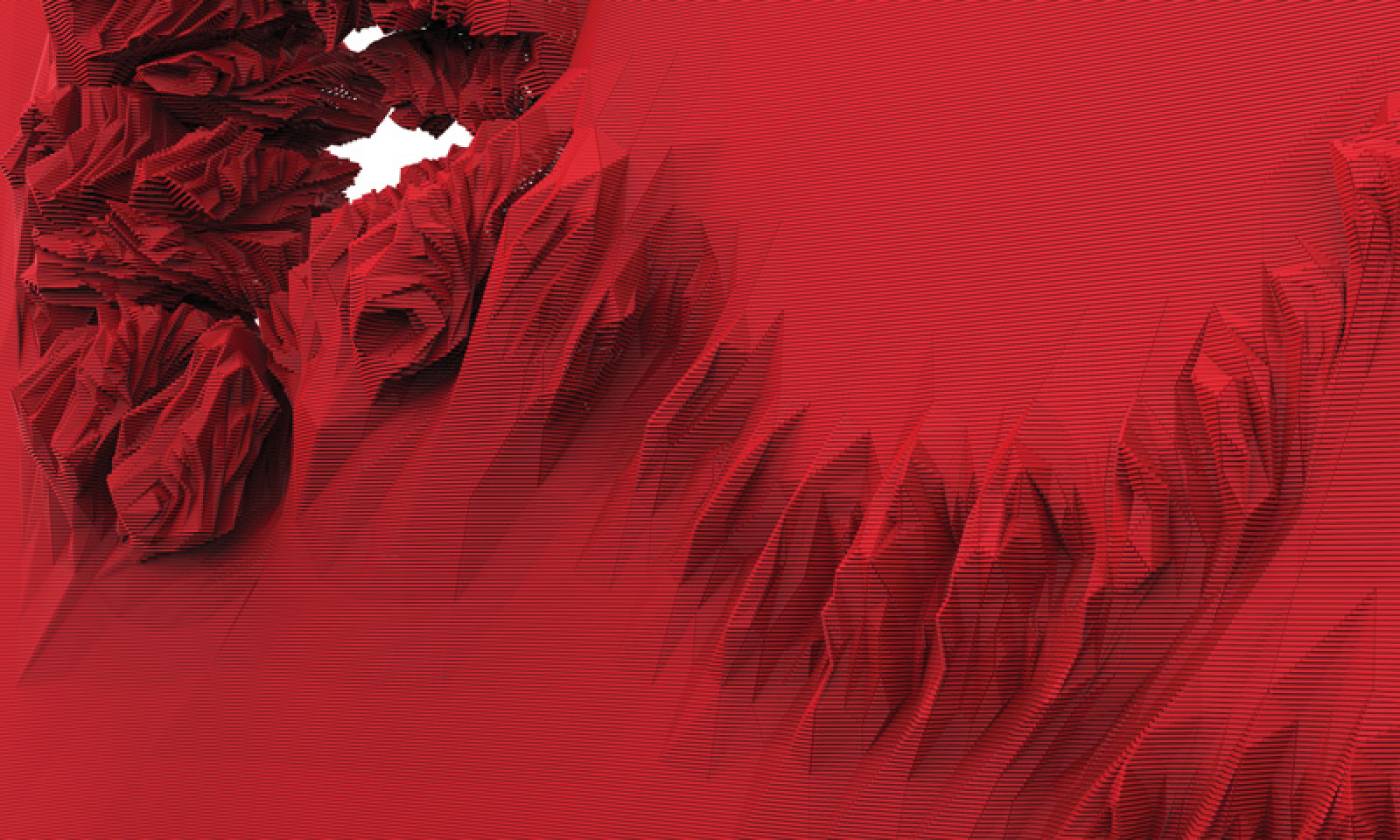
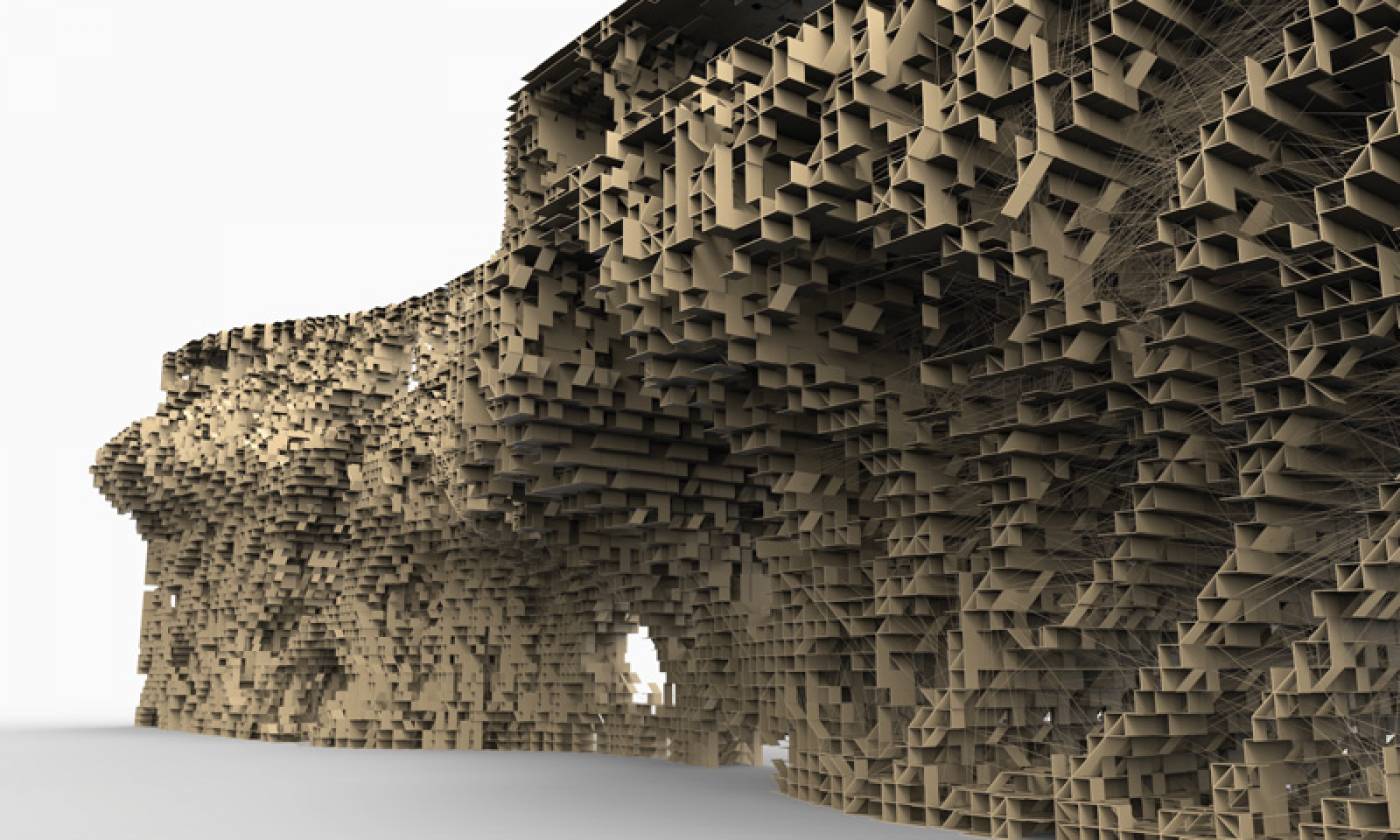
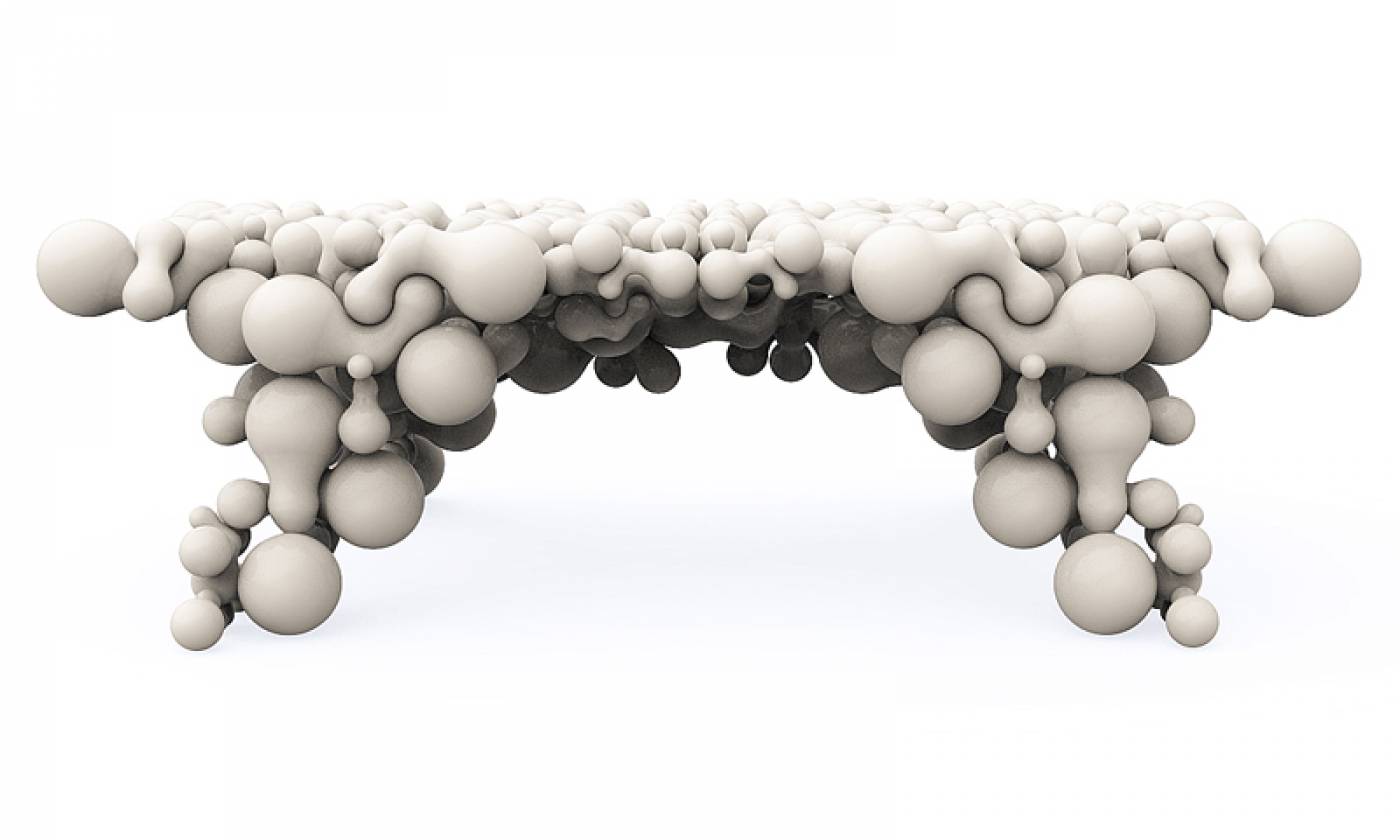
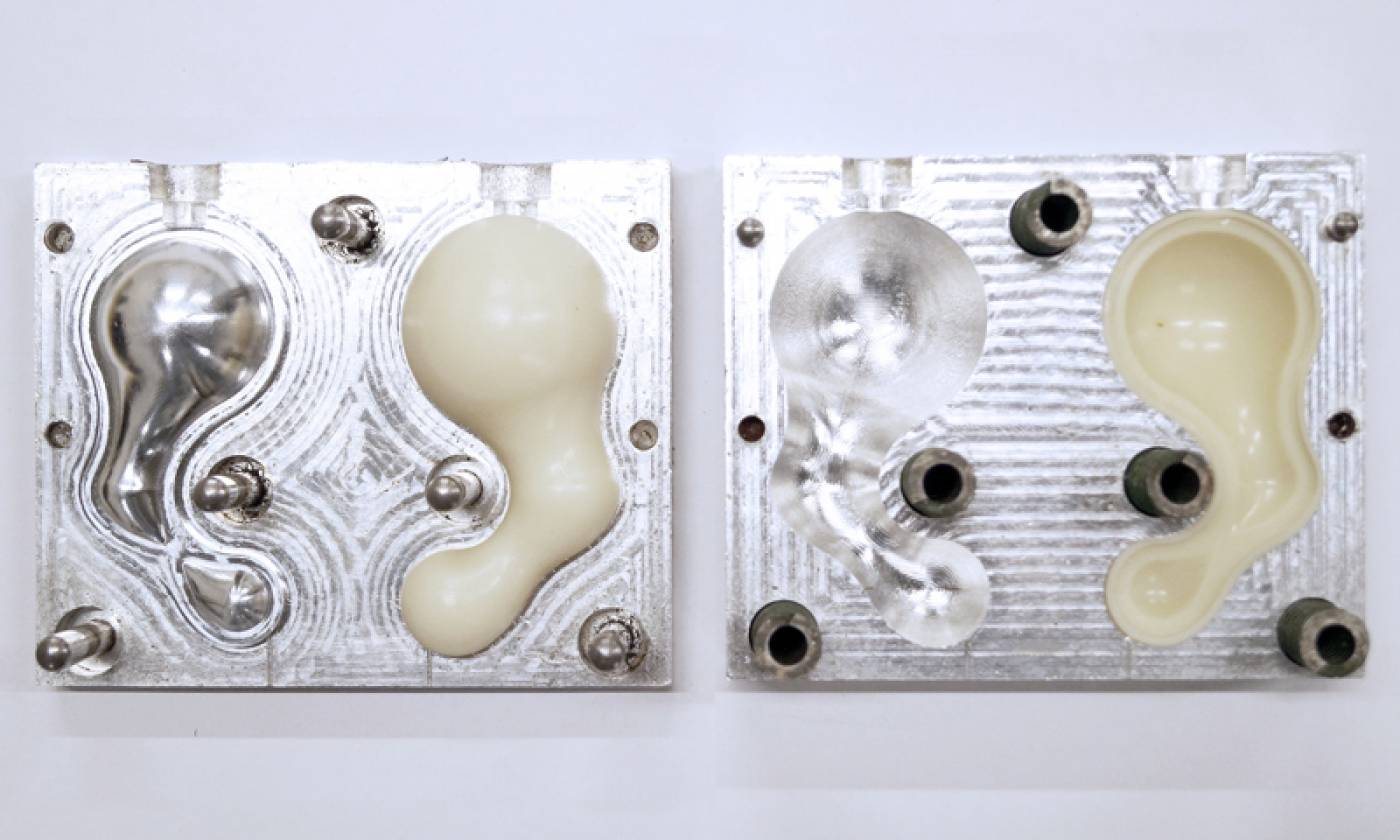
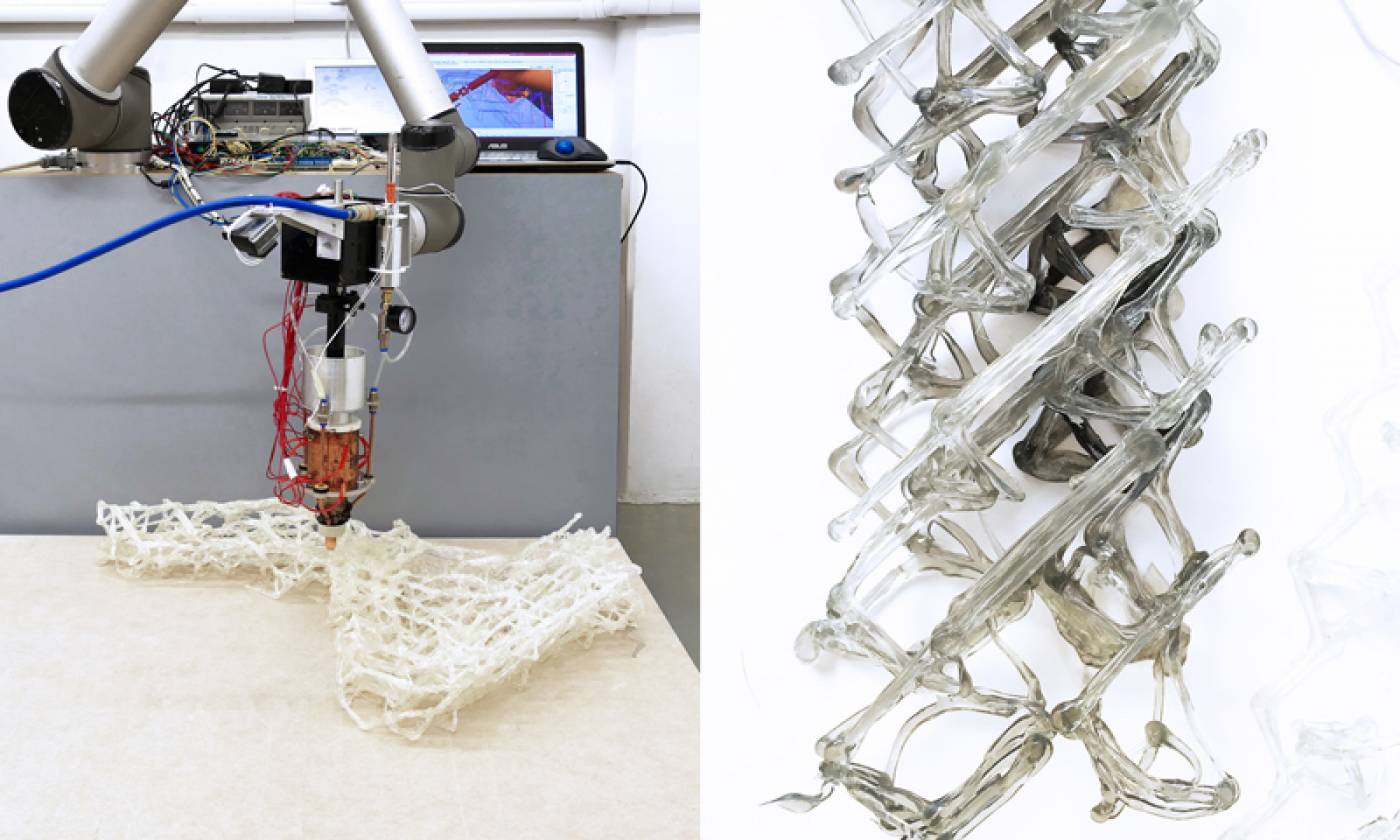
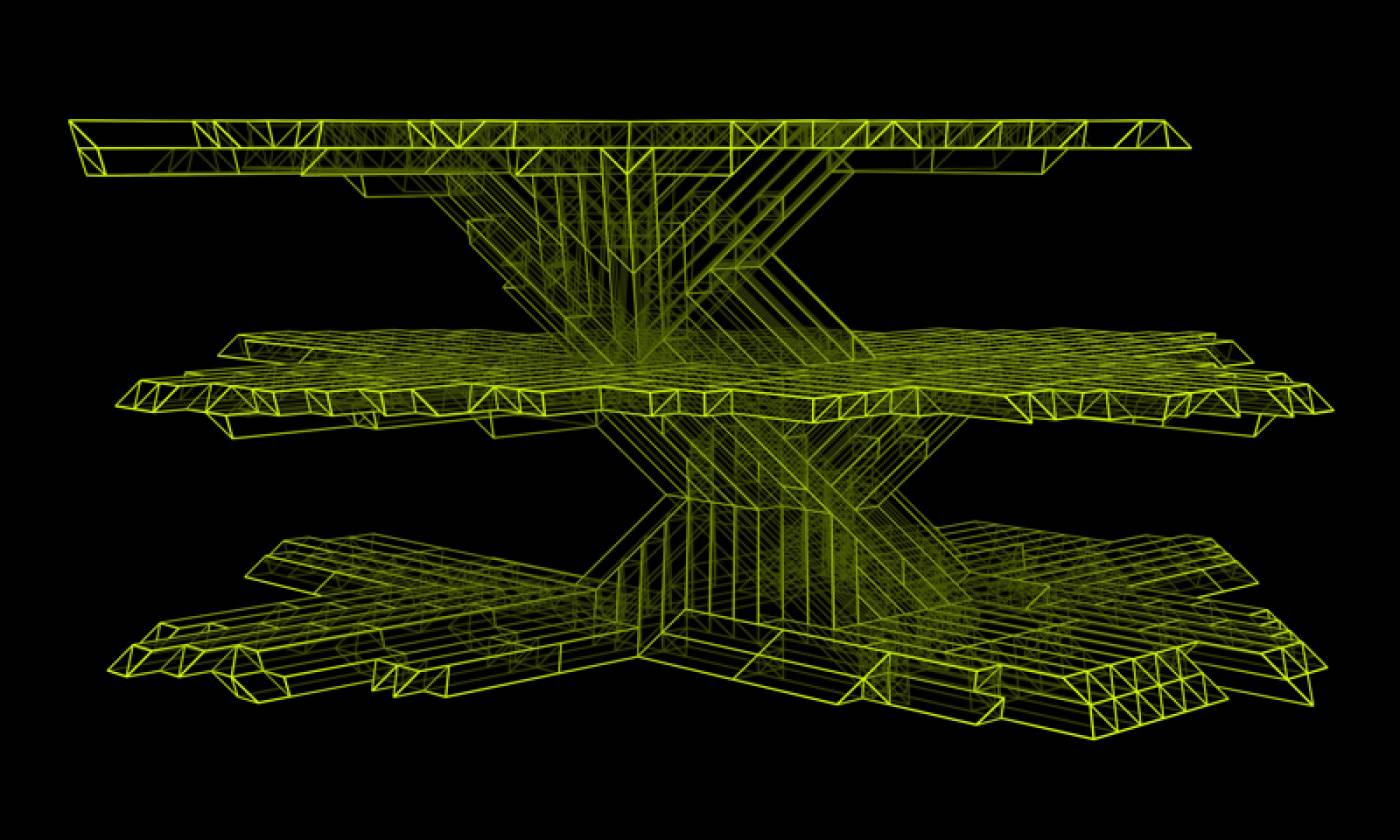
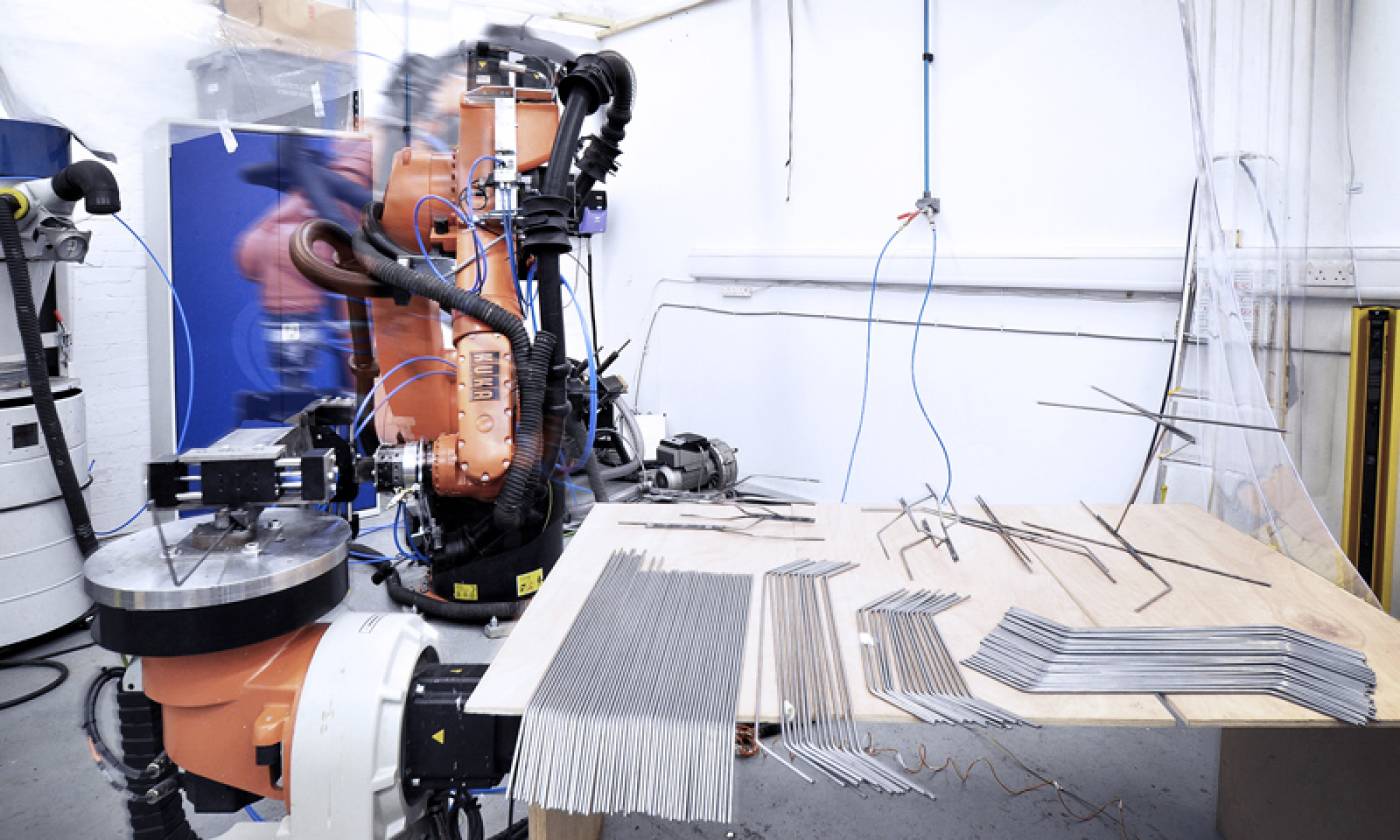
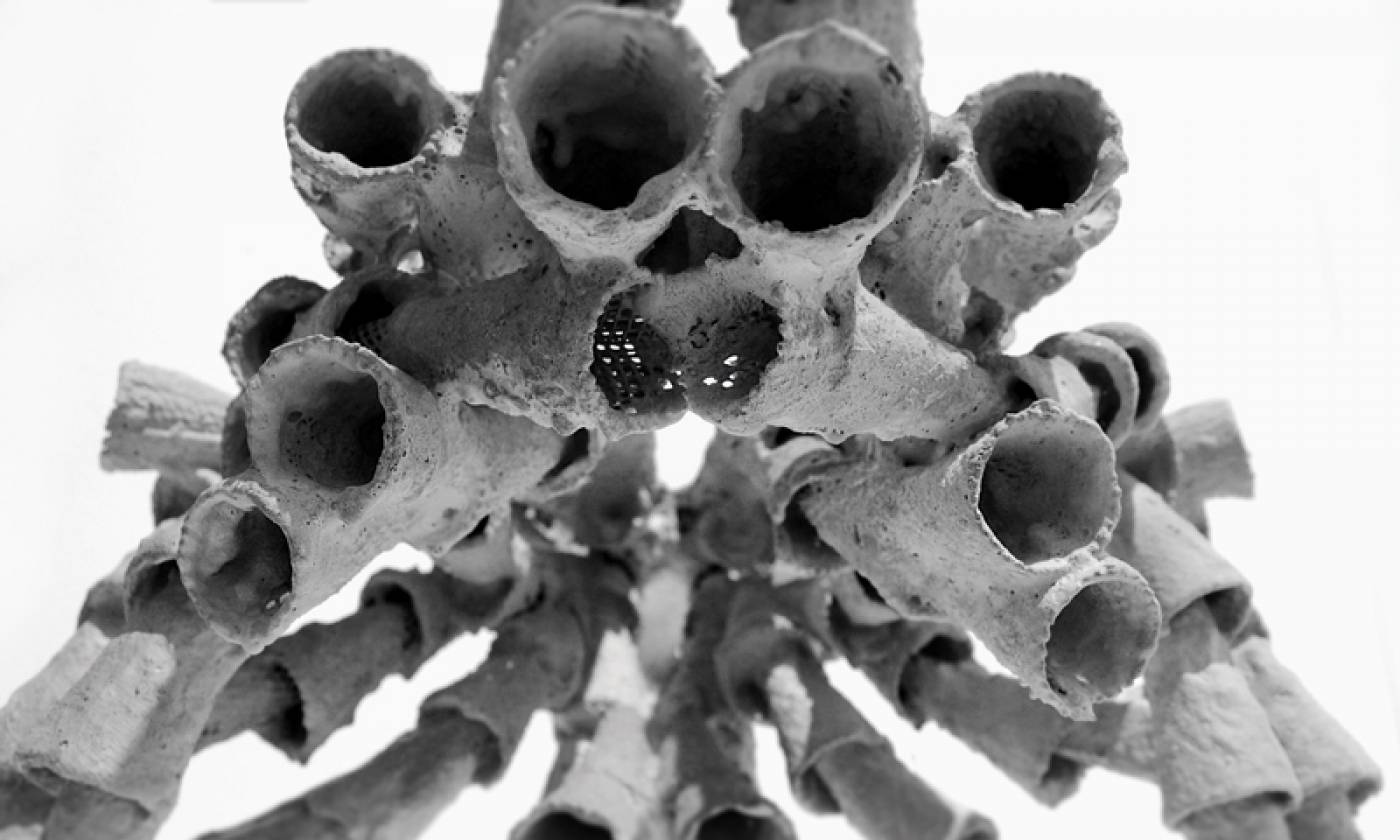
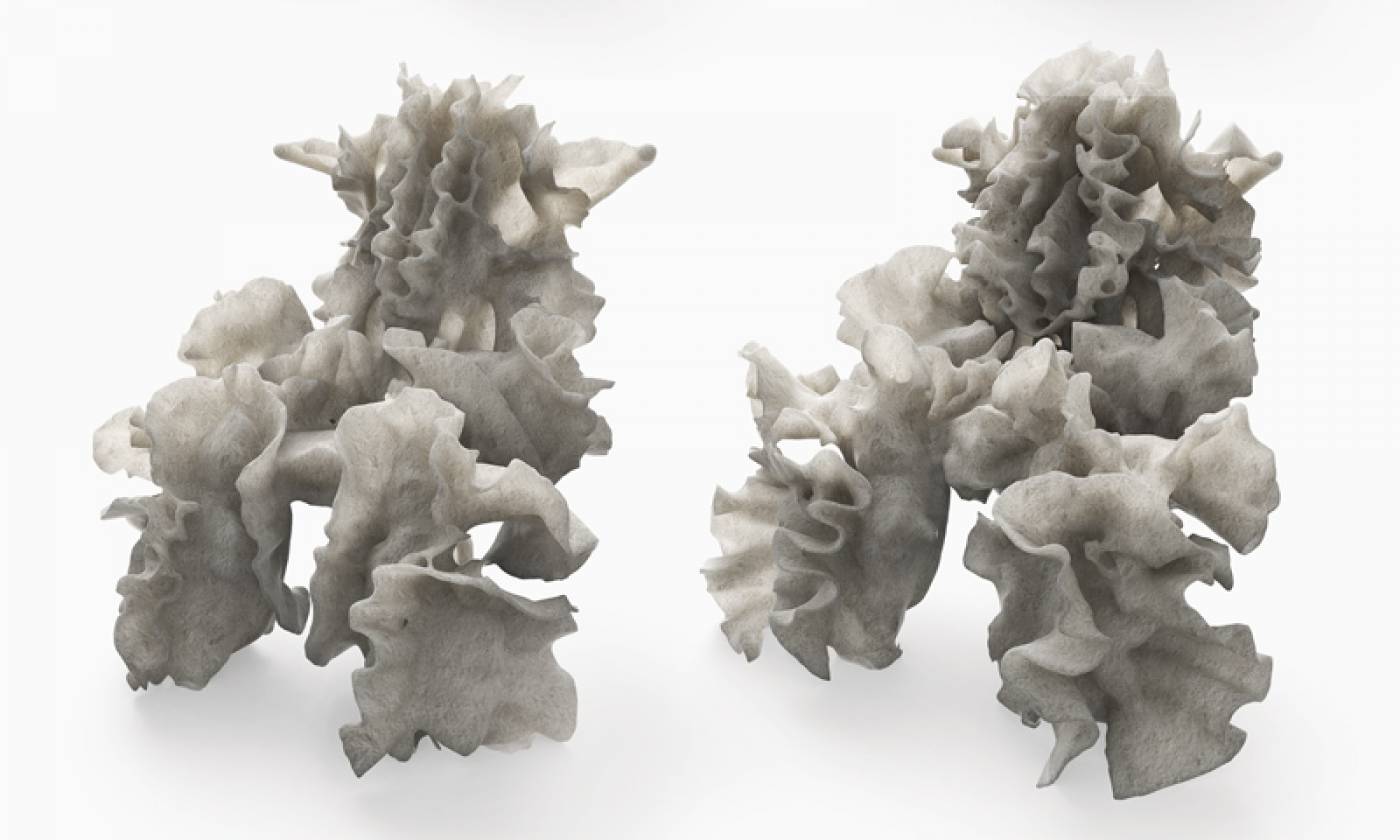
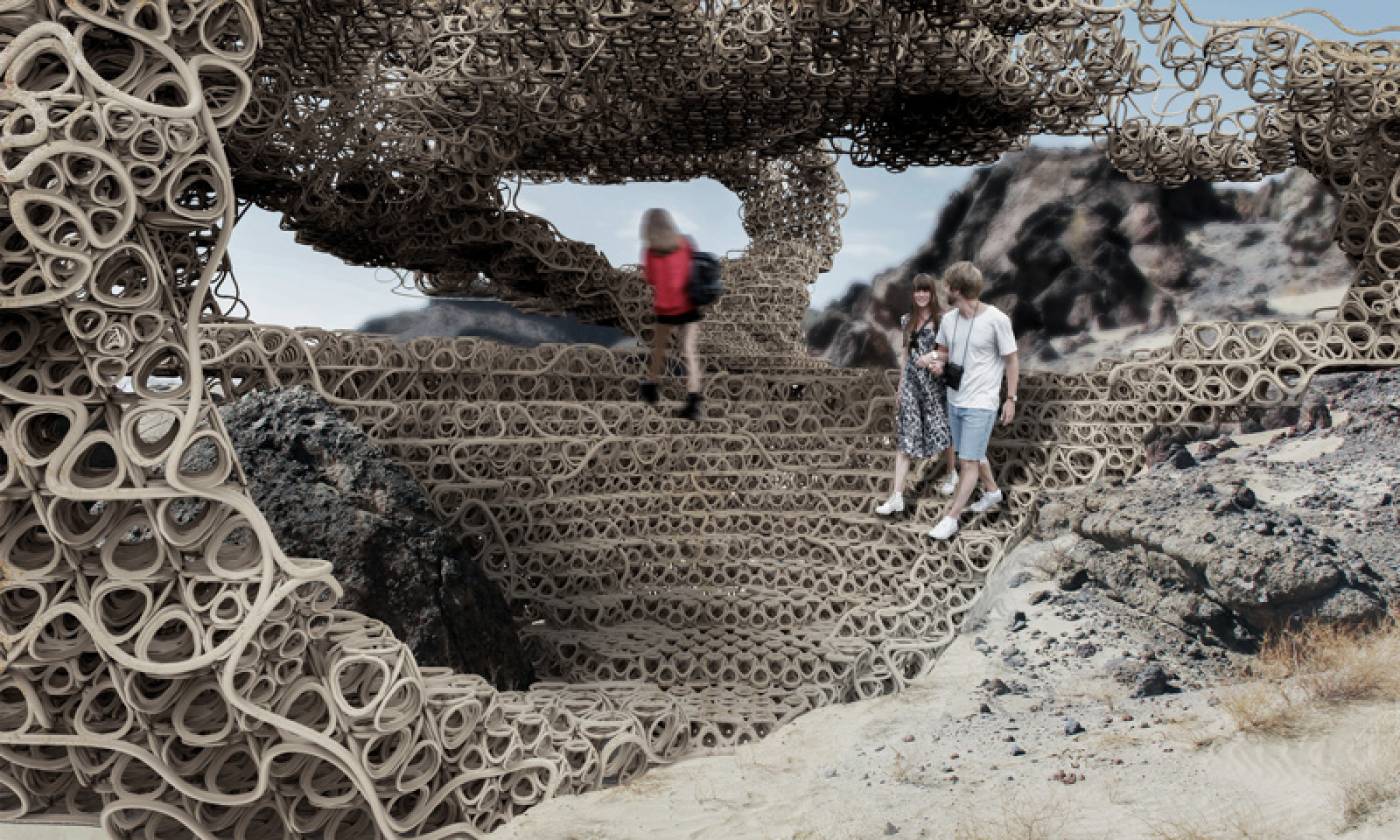
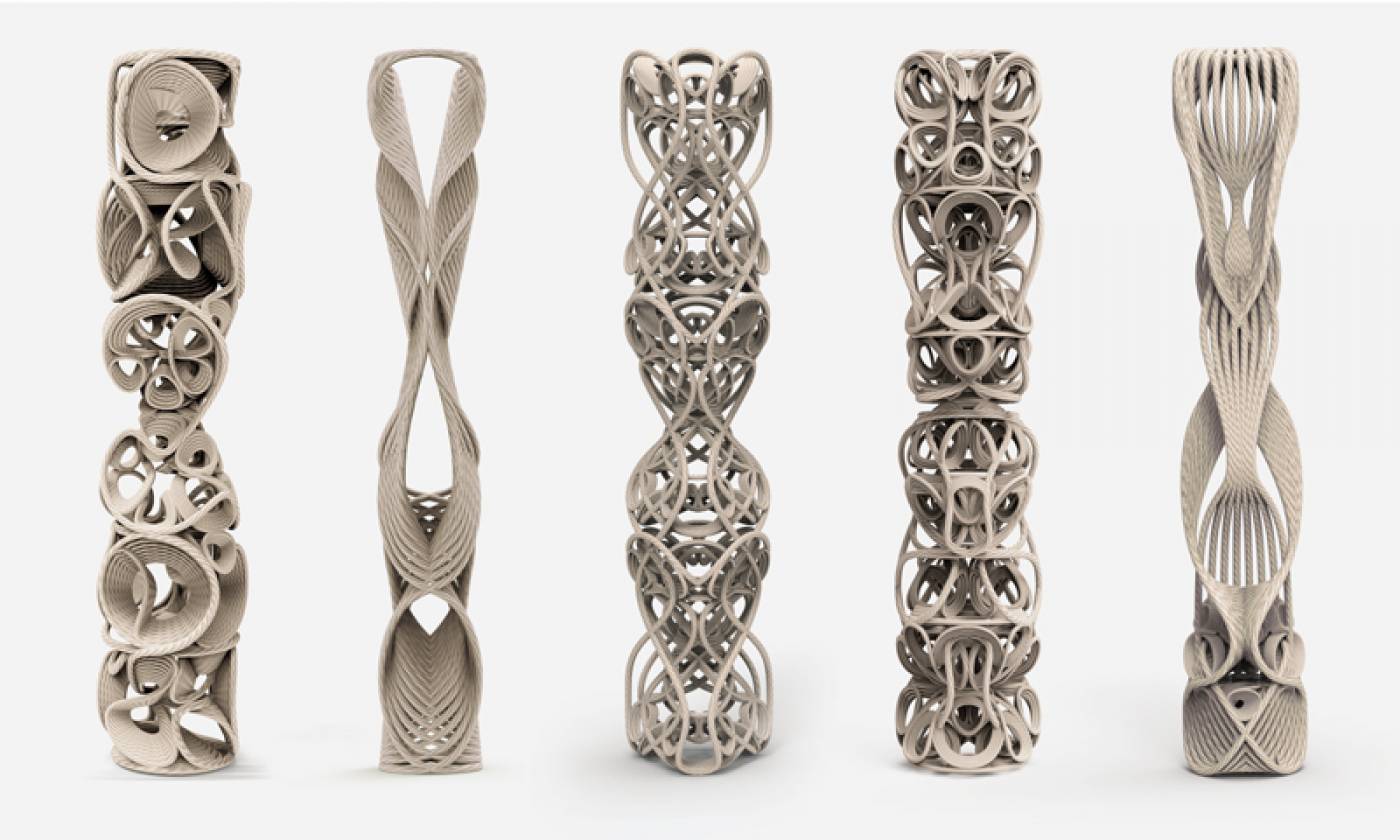
About
Design is a crucial agency for uncovering complex patterns. This programme belongs to the school's suite of B-Pro programmes and explores the frontiers of advanced architecture and design and their convergence with science and technology.
Spending around two thirds of their time undertaking studio-based design enquiry, students work with internationally renowned researchers and practitioners towards a major speculative design project and thesis. The design modules are structured in groups known as Research Clusters, each with its own research specialism, and all underpinned by shared technical and theoretical resources and expertise.
Architectural Design MArch culminates in the annual B-Pro Show – an exhibition of student work, attracting thousands of visitors to the school’s central London home.
Highlights
- Gain an understanding of the role computation plays in complex design synthesis
- Work with an international body of experts and students
- Be introduced to highly advanced coding, fabrication and robotic skills, and the latest approaches to AI, CNC fabrication, 3D printing, supercomputing, simulation and interactivity
- Have access to B-made workshop facilities and fabrication expertise unrivalled in the UK
Read about the Architectural Design MArch Research Clusters and labs below
Modules
Over the course of twelve months of study, students undertake six compulsory modules to the value of 180 credits.
- Architectural Design: Historical, Cultural and Theoretical Skills (15 credits)
Module coordinator: Mollie Claypool
In this module students learn the skills required to undertake theoretical, cultural and historical studies into the issues that underpin architectural design. Guided by their tutors, students focus on an individual research topic, which forms the basis of a literature review. Throughout this module, students will have the opportunity to develop their writing at a postgraduate level, analysing texts in depth to establish relevant content for their individual focus.
- Architecture Skills Elective (15 credits)
Module coordinator: Alvaro Lopez
Taught through workshops, seminars and practical tutorials, students develop a suite of technical skills, which complement their design research. These may include fabrication, computation, graphic design and other multimedia skills.
- Architectural Design Thesis Initial Projects (45 credits)
Module coordinator: Gilles Retsin and Tyson Hosmer
Working within a thematic Research Cluster led by two or more expert practitioners, students are introduced to theoretical architectural concepts to help develop their initial design projects and confirm the subject topic for their thesis. On successful completion of the module students will have an advanced understanding of the physical fabrication of designed elements and a knowledge of how to manipulate architectural concepts in a design context.
- Architectural Design Thesis Final Project (75 credits)
Module coordinator: Gilles Retsin and Tyson Hosmer
Continuing to work within their thematic Research Clusters, students build upon the work completed in the Initial Projects module to develop a final speculative research project, which demonstrates an advanced and specialist knowledge of their selected research area, and is exhibited at The Bartlett B-Pro Show in September. By the end of this module students will have developed innovative architectural concepts in a design context, through the use of physical fabrication, graphic design and other multimedia skills.
- Design Thesis Report (30 credits)
Module coordinator: Mollie Claypool
Students complete an illustrated critical evaluation of their Final Project, referring to appropriate theoretical and technical sources and demonstrating how the information from these sources is synthesised in their design. This may be derived from science, cultural theory, technology, architectural history, philosophy or the psychology of perception. On completion of this module students will have an advanced understanding of how theoretical, technical and precedent sources can inform design work.
Key information
Please note, this degree is not professionally accredited. If you are seeking a professionally accredited programme, you may want to consider Architecture MArch (ARB/RIBA Part 2).
Modes/duration
Full-time: one year, taught over 12 months
Entry requirements
A minimum of a second-class UK degree in an appropriate subject or an overseas qualification of an equivalent standard. Applicants with extensive experience in the field may also be considered.
A design/creative portfolio is also expected. Applicants will be asked to submit a portfolio of their design work once their completed application has been received, and should not send or upload work until it has been requested.
- Read the full entry requirements for this programme on the UCL Graduate Prospectus
- Read the full portfolio guidance
Application guidance for 2024 entry
Applicants can only apply for a maximum of two postgraduate degree programmes at The Bartlett School of Architecture.
Application deadline
Applications for 2024 entry will open on 16 October 2023 and close on 5 April 2024 (for applicants requiring a visa) and 30 August 2024 (for applicants not requiring a visa). We strongly advise early application, as our programmes are over subscribed and competition is high.
Deferral
It is not possible to defer an offer at The Bartlett School of Architecture. If you wish to be considered for the following year then you must reapply in the next admissions cycle.
Tier 4 Student visa holders
Tier 4 Student visa holders are required to meet the English language proficiency with sufficient time to allow them to obtain a CAS number and visa.
Accepting your offer
To accept your offer, you must pay the non-refundable fee deposit and decline any other offers for programmes at The Bartlett School of Architecture. If you do not respond within the given time indicated on your UCL offer letter, then your offer will be withdrawn.
Fees and funding
- Tuition fee information can be found on the UCL Graduate Prospectus.
- For a comprehensive list of the funding opportunities available at UCL, including funding relevant to your nationality, please visit the Scholarships and Funding section of the UCL website.
Staff
Directors
- Tyson Hosmer and Gilles Retsin, Programme Directors
Gilles Retsin is the founder of Gilles Retsin Architecture, lecturer at The Bartlett School of Architecture and co-director of the Design Computation Lab.
His work has been displayed internationally, including at the Centre Pompidou in Paris, the Museum of Art and Design in New York, the Vitra Design Museum in Weil-am-Rhein, Design Exchange Toronto and the Zaha Hadid Gallery in London. He has lectured and acted as a guest critic in numerous universities internationally.
- Professor Frédéric Migayrou, B-Pro Director
Frédéric Migayrou is Chair, Bartlett Professor of Architecture at The Bartlett School of Architecture and Deputy Director of the National Museum of Art, Centre Pompidou in Paris. He was the founder of the Frac Center Collection and of ArchiLab, the international festival of Prospective Architecture in Orléans. Apart from recent publications and exhibitions (De Stijl, Centre Pompidou, 2011; La Tendenza, Centre Pompidou, 2012; Bernard Tschumi, Centre Pompidou, 2013; Frank Gehry, Centre Pompidou 2014), he was the curator of Non Standard Architectures at the Centre Pompidou in 2003, the first exposition devoted to architecture, computation and fabrication.
More recently, he co-organised the exhibition Naturalising Architecture (ArchiLab, Orléans 2013), presenting prototypes and commissions by 40 teams of architects working with new generative computational tools, defining new interrelations between materiality, biotechnology and fabrication. In 2012 he founded B-Pro, a suite of postgraduate programmes at The Bartlett.
- Andrew Porter, B-Pro Deputy Director
Andrew Porter studied at The Bartlett School of Architecture and has collaborated in practice with Sir Peter Cook and Christine Hawley CBE. In 1998 he and Abigail Ashton set up ashton porter architects, through which they completed a number of award winning commissions in the UK and prizewinning competitions in the UK and abroad. Andrew is co-leader of Architecture MArch Unit 21, and has been a visiting Professor at the Staedel Academy, Frankfurt and guest critic at SCI-Arc, Los Angeles and Parsons New School, New York.
Research Clusters and Labs
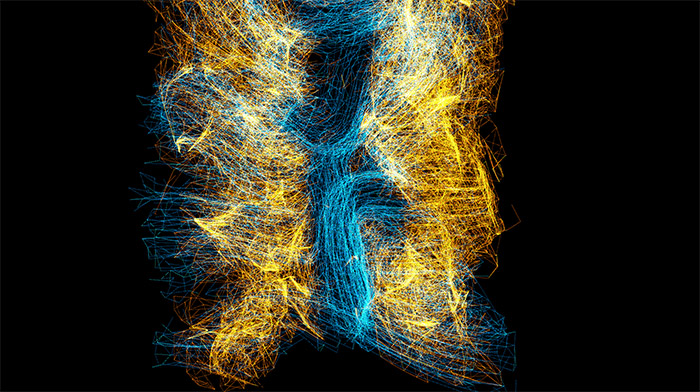 Architectural Design MArch students work collaboratively within teaching groups called Research Clusters, which allow them to pursue a rigorous approach to architecture within a speculative and creative environment.
Architectural Design MArch students work collaboratively within teaching groups called Research Clusters, which allow them to pursue a rigorous approach to architecture within a speculative and creative environment.
Research Clusters
- RC1
- Monumental Wastelands
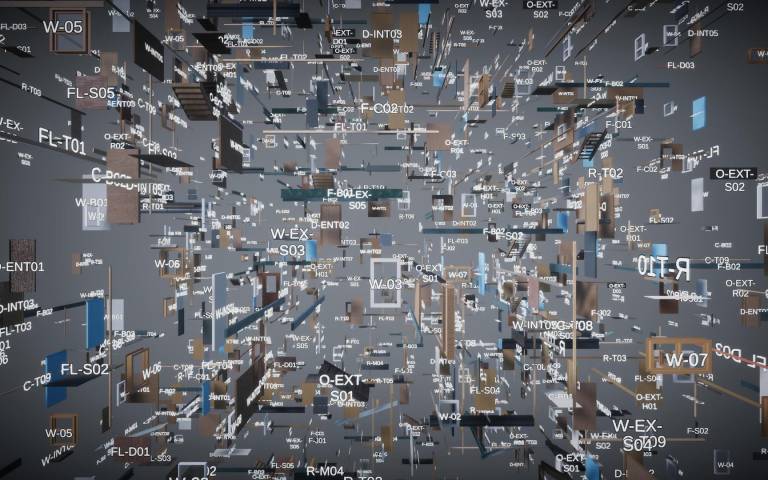
Déborah López and Hadin Charbel
Research Cluster 1 explores the imminent nature of the Anthropocene under the lens of ubiquity, examining the production of data, raw material, logistical processes and their impacts on contemporary scenes. Focusing on two strands of research topics, 'Cli-migration' and 'Autonomous Ecologies', speculations will be put forward that challenge current profit driven models, arguing for decolonisation, decentralisation, automation and participation, to collapse human and non-human perspectives.
A methodology of preservation through adaptation, referred to as 'decoding' and 'recoding', deploys a combination of machine learning, generative algorithms and video game engines, moving away from a nostalgic return, and instead embracing the uncertainty and possibilities through practical yet sensitively tuned, contextualised strategies.
This year the cluster is moving outside of the Arctic Circle, below the 66° line and into Europe, using Climate-Fiction (Cli-Fi) as a vehicle for these imminent realities to be researched, experimented with and projected.
Image: Gaming Consensus by Junyi Du, Beiyuan Zhang, Xiayi Zheng and Bingchuan Jiang
- RC2
- Robotic Architecture
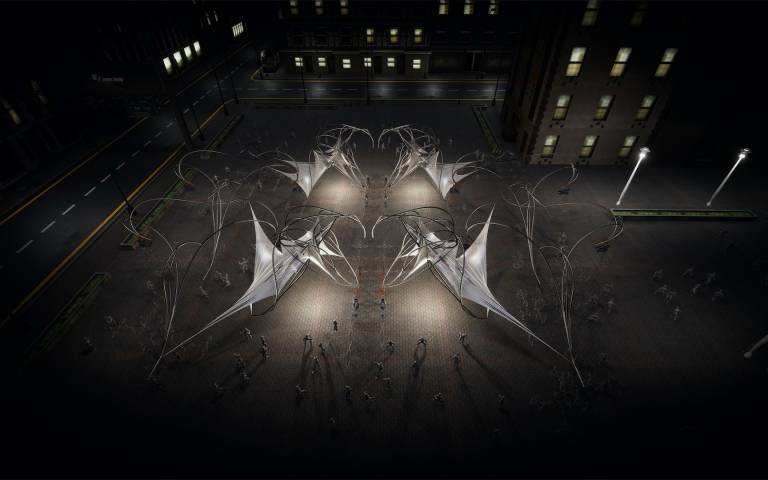
Valentina Soana
This year, RC2 explores emerging design possibilities of autonomous systems. It investigates the role of robotics in architecture beyond their use as fabrication and construction tools, moving towards a novel concept of architectural robots.
For a long time now, designers have envisioned building systems that can respond and adapt to multiple human, environmental and structural conditions. Recent technological advancements in robotics enable machines to be self-aware, plan and react to undetermined circumstances. The integration of robotic solutions into material systems can create novel structures that are able to self-form, reconfigure and achieve multiple states, operating and interacting at architectural and human scale.
The cluster focuses on the development of novel material-machine-kinetic systems where robotic operations are embedded within material systems and controlled in real-time by a cyber-physical network. Behaviours emerge, in turn, through negotiation between human, designer, material and machine interaction.
Image: Elastic Choreographies by Shahram Minoee Sabery, Cephas Bhaskar and Yelay Bayraktaroglu
- RC3
- Living Architecture Lab: AI and Autonomous Architecture
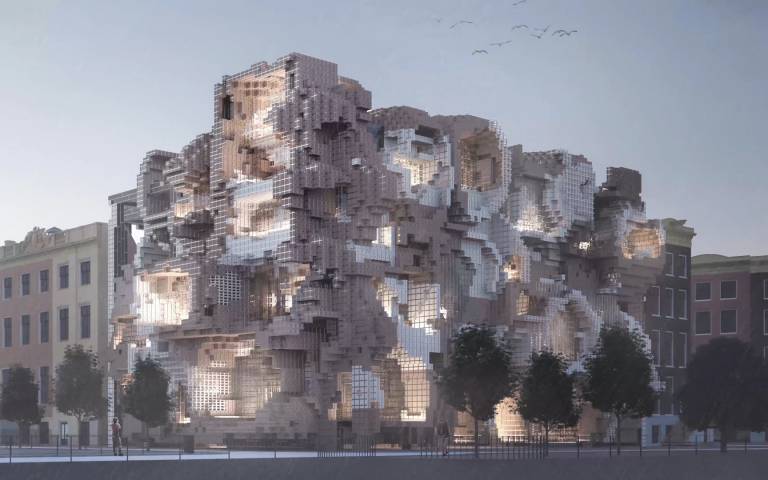
Tyson Hosmer, Octavian Gheorghiu and Philipp Siedler
Research Cluster 3 interrogates the notion of 'living architecture' as a coupling of living systems with the continuous assembly and reformation of architecture.
The research focuses on developing autonomously reconfigurable buildings with situated and embodied agency, facilitated variation, and artificial intelligence. The studio develops experimental design models embedded with the ability to self-organise, self-assess, and self-improve using deep learning to train assembly systems to improve at negotiating shifting architectural objectives. In parallel, the cluster develops architectural robotics and intelligent simulation models in a tightly coupled feedback loop for an architecture that is self-aware. The studio reappraises linear building life cycles holistically, learning from living systems extraordinary scalable efficiencies of adaptive construction with simple flexible parts.
This year, RC3 will rethink notions of “Home”, “Work” and “Factory” as separate building typologies. Projects will investigate new socio-economic models and scalable platforms that enable the formation of emergent communities through novel distributed living, working, and production models aligned with autonomously adaptive architectural systems.
- RC4
- Architecture and Automation: Matter, Home, Platform
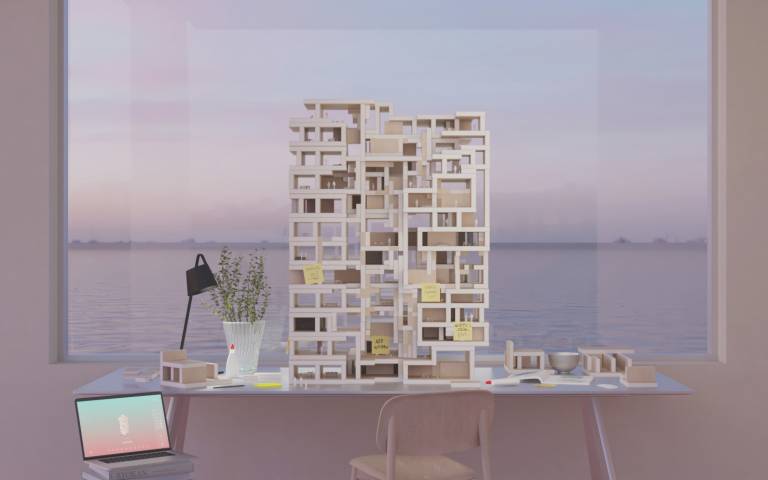
Manuel Jimenez Garcia, Gilles Retsin and Kevin Saey
From tiny bits of matter to territorial-scale housing platforms, this year RC4 continues its agenda on housing and automation. Students will look to find “Home”, as a condition emerging somewhere in between these vastly diverging scales. The cluster will develop the imagination, tools and thinking to enable mission-driven, non-extractive, distributed and scalable platforms for housing, for a more equal, sustainable and inspiring build environment.
Mindful of the social and political consequences of automation, students will learn from emerging tech platforms to develop community-driven alternatives for homes and housing. RC4 will look at everyday automated workflows set in the present, while being invested in radical spatial and aesthetic agendas for the future. RC4’s research will investigate new narratives for community, work, life and domesticity in an increasingly automated world; and question topics ranging from life with autonomous entities, robots and artificial intelligence, mobile robotic mini-factories to viral platforms, primitive materials and activism.
This Research Cluster is affiliated with Automated Architecture Labs.
Image: With / Without by Argyrios Delithanasis, Ghanem Younes, Santiago Del Aguila and Andrea Terceros Barron
- RC5 & 6
- Ordinary Material
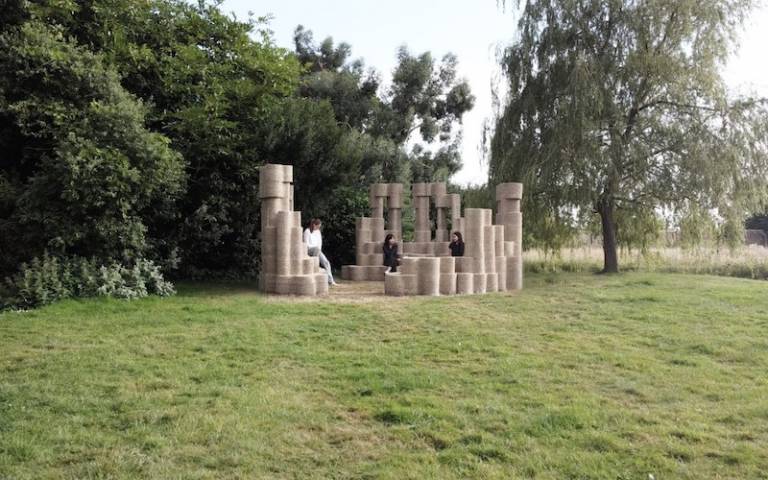
Adam Holloway, Guan Lee and Daniel Widrig
How can non-ordinary uses of material play a role in architecture and design experiments? What makes a material ‘ordinary’? How are the conflicts in use and design of material be considered ordinary in different situations? Do surprising outcomes in material use arise because of the ‘misuses of material’ or unexpected results must be attributed to ‘new material’?
One can argue that each material has an ideal expression based on the material’s property and innate quality and ability to be. As we depart further away from the naturalness of a material, do we necessary arrive at innovative materiality? How do we measure the performance of such inventiveness without appropriate use?
RC5 & 6 does not advocate the disregard of pragmatic concerns in material use, but rather a closer examination of different roles in which context can play above and beyond practicality. Ordinariness is not ordinarily ordinary. Materiality is not materially stable. RC5 & 6 encourages design and making within a critical framework that is anything but ordinary.
This Research Cluster is affiliated with Material Architecture Lab.
Image: Hempstack, 2021, Material Architecture Lab
- RC7
- Biospatial Assemblies
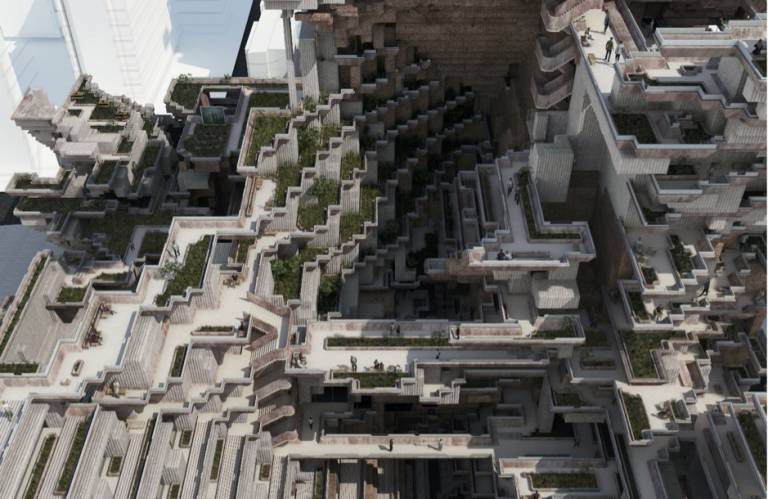
Richard Beckett
This year Research Cluster 7 will progress its agenda on biodesign and architecture, with a specific interest in the role of AI and machine learning for the conception of living buildings and the development of novel biofabrication technologies.
Considering the contemporary understanding of the human as a holobiont along with shifting modes of biopolitics, students will develop novel spatial assemblies for multiple living agencies across a range of building typologies. Projects will seek to provide new narratives for urban living alongside radical solutions addressing issues including urban growth in the age of the Anthropocene, smart buildings and healthy urban environments. Topics and themes this year will include bio-augmented design, resilient infrastructure, novel architectural tectonics and large-scale fabrication.
Image: More Than Human by Christopher Whiteside, Zhan Xu and Yi Sui
- RC8
- Fused Space and Continuous Lifecycles
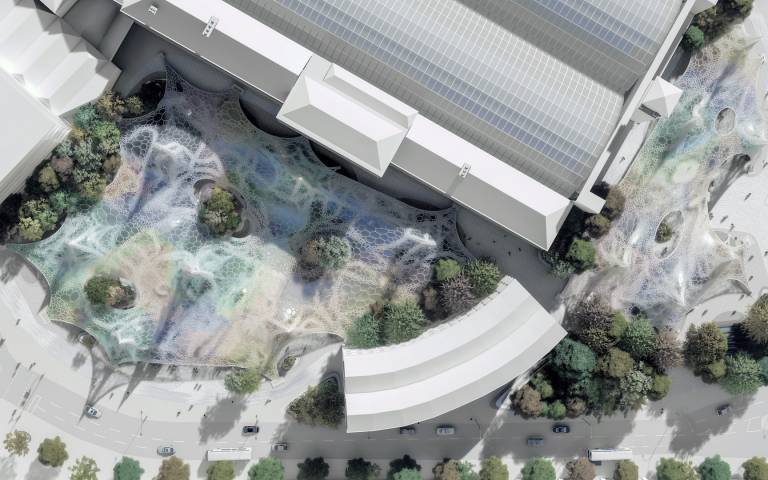
Kostas Grigoriadis
Research Cluster 8's main research focus is multi-material design, and the wider implications that the use of multi-materials will have on architecture and building construction. RC8 explores new procedures of designing and building with material gradients, aiming to rethink component-based assembly and the standard practice of twentieth century mechanical connectivity.
In previous years, the Cluster investigated the use of robotic fabrication for the in-situ 3D printing of building facades and the fusion of materials such as metal and glass to generate component-less, materially continuous envelopes. This year students will research into the origins of the materials that make up larger multi-material topologies from recycled sources, and the end-of-life strategy of the buildings and structures that will be deployed across London.
Image: Recycled Plastic Lattice by Sai Feng, Huiyin Pan, Gaojie Zhang, Sen Wei
- RC9
- Architecture for the Augmented Age
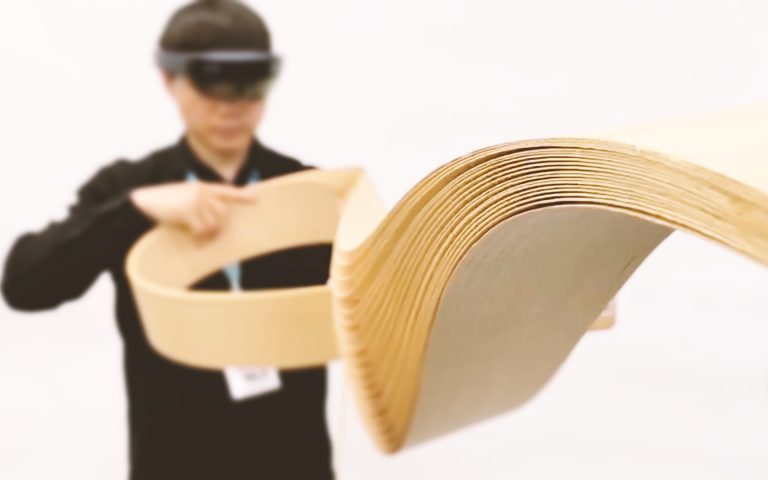
Alvaro Lopez Rodriguez and Igor Pantic
As we immerse ourselves into rapidly developing Extended Realities (XR), the barriers between humans and machines are becoming increasingly blurred, with portable devices augmenting our perception of the environment. XR have the capability to assist processes, enhancing human labour with data previously exclusive to machines while enabling seamless inclusion of intuitive decision-making and experience, often absent from automated construction processes. XR technologies can also radically change how one interacts with and experience the built environment, enhancing or altering or adding a new layer of information to the surrounding environment.
Research Cluster 9 explores how XR technologies can change ways of designing, building and interacting with the environment. Ideas like augmented manufacturing, gig economy or digital platforms for multi-player design and distributed manufacturing, as well as immersive experience and interaction with the built environment and the metaverse, will therefore actuate as the central core for all the research streams.
Image: by Team LaminAR: Yiguan Liu, Laizhen Wu, Xinlu Chen, Zheshun Liang, Architectural Design, RC9
- RC10
- Ecocentrism

Barry Wark
RC10 is motivated by ecocentrism, giving value and consideration to all matter in the creation of an ecological architecture.
The research uses machine learning and artificial intelligence to remove anthropocentric bias through procedural design tools. To achieve this, RC10 develops methodologies which integrate environmental information and consider nonhumans within its processes, resulting in a bio-diverse, built environment.
Students will explore ecological aesthetics, considering how architecture can move beyond the sweetness and control of ‘nature’-design towards qualities that question the interconnectedness of artefacts with the atmosphere and other ecological agents.
The cluster conceives buildings as open and adaptive, operating over large timescales with multiple lives and post-lives of occupants and fragments. In doing so, students imagine new forms of inhabitation in urban spaces that foster ecocentric values. RC10 investigates the methods, means and production that would allow for such an architecture to be realised in the world, encompassing digital fabrication, assembly, and novel materials.
Image: Hempcrete
Labs
AD Labs
B-Pro Labs are research and teaching environments affiliated with The Bartlett School of Architecture's suite of B-Pro programmes.
- Automated Architecture Labs
Lab Directors: Mollie Claypool, Manuel Jiménez Garcia, Gilles Retsin
Automated Architecture (AUAR) Labs is a consortium of research streams at The Bartlett School of Architecture, operating at the intersection between architecture and technology. Our projects bring advanced technologies, design, people and communities together to radically rethink architectural production.
The work of AUAR Labs focuses on architecture, automation and issues of social justice such as housing, platforms, the future of work, localised manufacturing and circular economies. We believe in the future of architecture being one that is inclusive and equitable, and which centres the role of automation simultaneously with people, their values and lived experiences of the built environment. We engage automation to create a more inspiring built environment for all. We advocate for horizontal, participatory and equal social practices in architecture and technology where individual autonomy and freedom, supported in a structure of care, lead to more creative, inspired and empowered people and more just built environments. This embodies a fundamental shift in architecture and technology that is unique to our research and projects.
AUAR Labs is affiliated with Architectural Design Research Cluster 4.
- Material Architecture Lab
Lab Directors: Guan Lee, Daniel Widrig
In Material Architecture Lab, our research starts by asking questions about materials through design, both digitally and manually. With the prevalence of digital tools, the capabilities of industrial production have migrated from factory floors to smaller-scale workshops, laboratories and research facilities everywhere. When this recent development is coupled with advances in material science at microscopic scale, and the availability of specialist tools to customise materials, the prospect of a new kind of architecture is now imminent.
We encourage making without preconceptions, allowing the characteristics of the material, and fabrication techniques, to inform and enrich the outcome. We encourage students to be adventurous in questioning established modes of production. The nature of our experimentation is grounded in cyclical processes of making prototypes with rigorous and iterative refinements of products or processes. Our work is as much about traditional making as it is about computation and digital technology.
Material Architecture Lab is affiliated with Architectural Design Research Clusters 5 & 6.
Careers
The Bartlett School of Architecture is one of the world's top-ranked architecture schools and our graduates enjoy excellent employment opportunities.
Contacts
Programme Directors: Tyson Hosmer and Gilles Retsin
Departmental Tutor: Claire McAndrew
Postgraduate Admissions: Emmanuelle Gold
Programme Administrator: Tom Mole and Tung Ying (Crystal) Chow
Programme admissions enquiries: Complete the contact form
 Close
Close


